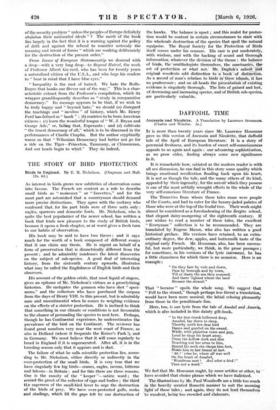DAFFODIL TIME
Aucassin and Nicolette. A Translation by Laurence Housman. (Chatto and Windus. Be.)
IT is more than twenty years since Mr. Laurence Housman gave us this version of Aucassin and Nicolette, that daffodil tale of the April of European literature. It is a story of perennial freshness, and its burden of sweet self-consciousness appeals to us again and again ; our advancing sophistieation, as we grow older, finding always some new significance in it. • It is remarkable how, satiated as the modern reader is with all sex discussion, he can find in this story some quality which brings emotional recollection flooding back upon his heart. It is not as though the tale, and the many others of its kind, appealed by their ingenuity, for the naiveté which they possess is one of the most artfully wrought effects in the whole of the very self-conscious literature of France.
The Trouveres from whom these tales came were people of the Courts, and had to cater for the luxury-jaded palates of those who were at the top of the feudal tree. Their work might almost be considered as a foreshadowing of the Bergere school, that elegant dairy-mongering of the eighteenth century. If one wishes to read a number of these tales, the excellent ." Everyman " collection is to be recommended. They are translated by, Eugene Mason, who also has written a good ,historical preface. His versions have retained, to an extra- ordinary degree, the dew, apples, and buttermilk taste of the original early French. Mr. Housman, also, has been success- ful, but more particularly, we think,, in the prose" passages ; for sometimes, in his versions of the lyric intermezzi, he has a little clumsiness for which there is no occasion. Here is an example :
" On they fare by vale and down, Pass by borough and by town, Till at dawn the sea they scanned, And there 'lighted where the land Became the strand."
That " became " spoils the whole song. We suggest that " Fell to the strand," though perhaps less literal a translation, would have been more musical, the labial echoing pleasantly from those in the penultimate line.
' Here, too, is one lyric from the tale of Amabel and Amoris, which is also included in this dainty gift-book.
" In the tree-trunk hollowed deep, Amabel, lay down to sleep,
Thereby seeth her dear lord Dance and gambol on the award, While, with plaintive voice and gay, Loud he sings his heart away. From the hollow dark and dim Reaching out her arms to him, Hound lus neck she clasp&him fast, Holds him. to, her breast at last. Ah ! ' cries he, where all was well On the heart of Amabel,
Wondrous nest 1 An3 what a bird ! ' Then not a word." .
We feel that Mr. Housman ought, by some artifice or other, to have avoided that choice phrase which we have italicized.
The illustrations by Mr. Paul Woodroffe are a little too much in the heavily scented Rossetti manner to suit the morning .light Of these tiles ; and again, they do not lend themselves to woodcut, being too crowded and elaborate.






































































 Previous page
Previous page